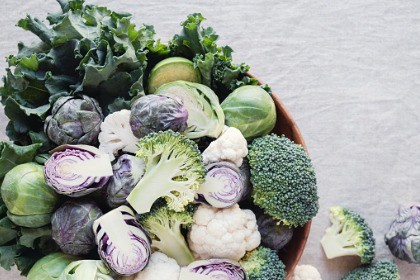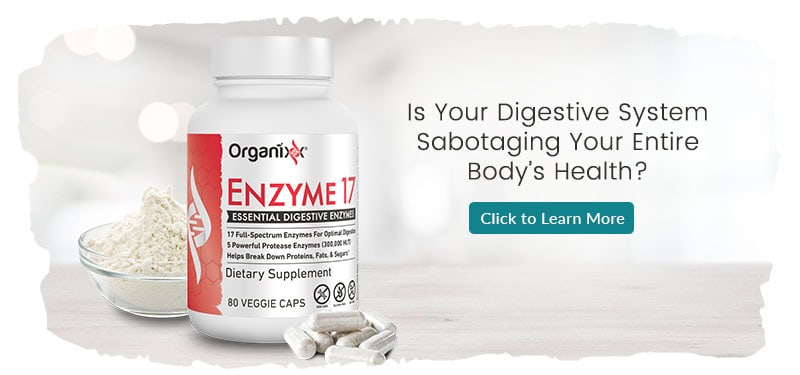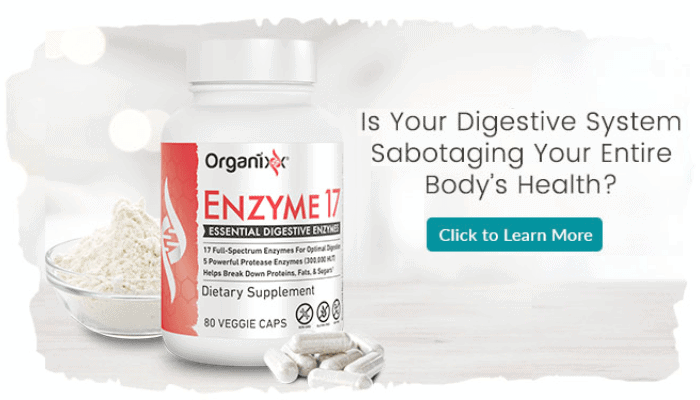How many times a day do you pass gas? They say the average person breaks wind (i.e., farts) about a dozen times per day. Flatulence, as it’s also called, is a universal part of the human condition. It’s a natural byproduct of our bodies working hard to digest the foods we eat and the beverages we drink… or is it?
Though normal, as in it’s a regular occurrence for most people, excessive flatulence certainly isn’t optimal. Farting is more often than not a sign that your body is having trouble converting the raw nutrition you’re giving it into the molecular components it actually needs in order to function – especially if you’re passing a lot of gas [1].
The occasional toot isn’t necessarily anything to worry about. But feeling like there’s a science experiment constantly brewing in your gut might be a sign that you need some serious digestive assistance.
If you’re one of the millions of people who suffer from excessive flatulence, read on because there’s hope for you. You’re certainly not alone, and there are solutions that are simple and natural that won’t break the bank (or wind ;-)).
Common Reasons for Passing Excessive Amounts of Gas

When it comes to what causes farts, many health authorities will tell you that swallowing excess air while you’re eating or drinking is one common culprit.
Another is consuming too many carbohydrates, including sugars. But excessive flatulence can be bit more complicated than that.
Your Digestive Process Relies on Enzymes
Before they even reach your stomach, the foods you eat and the beverages you drink first interact with saliva in your mouth. Your saliva naturally contains enzymes that initiate the process of digestion.
Once in your stomach, these partially digested proteins, carbohydrates, and fats then interact with stomach acid before passing into your small intestine for the next round of enzymes, which are released by your pancreas [2].
As long as all the necessary enzymes and stomach acids are present in adequate amounts (i.e., you don’t have low stomach acid) to handle everything you consumed, your meal should pass without a hitch – meaning with minimal flatulence. If it doesn’t, then this could be a sign that you have an enzyme deficiency.
Where Do Digestive Enzymes Come From?
While your body is programmed to make many different types of enzymes, it also relies on additional enzymes naturally found in food for added support.

However, many of these food enzymes are missing due to cooking or heavy processing, which means your body has to work extra hard to handle this digestive load all on its own [3].
Over time, this huge burden can create enzyme deficits in your body that are linked to digestive issues such as constipation, bloating, and passing excessive amounts of gas that just won’t stop.
4 Food Groups That Can Contribute to Increased Flatulence
Certain foods tend to cause more flatulence than others, including:
- Fruits
High in fructose (a type of simple sugar), fruits are difficult to digest for many people. Some fructose might pass through the small intestine while the rest ferments in the colon, causing a continual release of hydrogen and methane gases that create flatulence [4].
- Beans
High in oligosaccharides (complex sugars), beans are troublesome for many people –unless they’re properly soaked before being cooked – because the human body can’t produce an enzyme known as alpha-galactosidase that’s necessary to fully digest them [5].
- Cruciferous vegetables
High in cellulose, a difficult-to-digest fiber, as well as raffinose, a complex carbohydrate, cruciferous vegetables like cabbage, broccoli, and Brussels sprouts are notorious for causing people to pass a lot of gas. That’s because without the presence of the enzyme cellulase to break it down into glucose or a disaccharide, all that cellulose ends up ruminating in the digestive tract as it slowly and eventually gets eliminated. This is also true for raffinose, which similarly requires the enzyme alpha-galactosidase in order to fully digest [6].
- Meat, eggs, and dairy
Meat, eggs, and dairy products also tend to be fart-inducing, as they take much longer than fruits and vegetables to digest and pass through the digestive tract. As a result, these food items tend to marinate in digestive juices for hours on end, creating all sorts of gassy byproducts that have to be released – often with smelly consequences [7].

Keep in mind that some amount of gas associated with the above foods is considered normal and this doesn’t mean you need to avoid them. Cruciferous vegetables, in particular, offer a wealth of health benefits.
You may need to start with smaller servings while also helping the process along by preparing these foods with maximum digestion in mind. Think raw, fermented, or cultured, whenever possible. Eating plenty of enzyme-rich foods such as pineapples, bananas, kiwifruits, ginger, and avocados, can also help by providing your body with vital digestive enzymes.
When You Just Can’t Stop Passing Gas
It’s when seemingly everything you eat starts to cause digestive upset and corresponding “fart storms” that it might be time to evaluate what’s really going on inside your body. If your pipes are constantly backing up no matter what you seem to eat (releasing those ever-present foul odors and offending everyone around you), something is likely wrong and in need of fixing.
3 Strategies for Tackling Excessive Flatulence
If constantly passing gas is affecting your life and you want to learn how to fart less, the first thing you’ll want to do is take a careful inventory of your routine diet.

If you consume lots of processed, sugar-rich foods, these need to go if you hope to make any sort of noticeable headway in calming your excessive farting.
The second thing is to make sure you’re eating plenty of “living” foods that are naturally high both in enzymes and probiotic bacteria. Probiotics (aka “good bacteria”) pick up where enzymes leave off to ensure that the foods you eat are fully digested by the time they reach your intestinal villi. These little finger-like projections that line your small intestine are responsible for assimilating molecular nutrients from your digestive tract into your bloodstream.
Probiotics have also been shown to help stabilize the microbial environment within the gut, calming the digestive seas, so to speak, and keeping all those prolonged “science experiments” to a minimum [8].
The third, and perhaps most important, factor is to ensure that your body is well-stocked on enzymes. If you’ve been consuming enzyme-deficient foods for a substantial period of time, chances are your body has reached enzymatic exhaustion from having to work all that overtime just to keep up. In other words, your enzyme levels are suffering.
Beyond just consuming more enzyme-rich foods, another way you can really prime those digestive pumps is by adding in a powerful, full-spectrum digestive enzyme supplement into your regimen that covers all the bases in each enzymatic category.
The Best Digestive Enzyme Supplements Cover All the Bases
While proteolytic enzymes, as they’re sometimes called, primarily tackle proteins, a true full-spectrum enzyme formula will also cover carbohydrates and fats, ensuring they all get fully broken down into the smallest possible molecular components for maximum digestion.

By incorporating a digestive enzyme formula into your diet, your body won’t have to work as hard to extract the nutrition you need from the foods and beverages you consume.
Whatever nutrition is left over can be used by your body for systemic repair and maintenance, with potential benefits in other areas such as preventing autoimmune disease, viral infections, cancer and treatment-related symptoms, and chronic inflammation [9].
It’s important to remember that when your food isn’t being fully digested, your body can start to recognize it as a bombardment of allergens rather than nutrition. This is definitely something you want to avoid, and digestive enzymes can help with this, including with the “big three” types of enzymes:
- Amylase, which targets starches, or carbohydrates
- Protease, which targets proteins
- Lipase, which targets fats
Important Subcategories of Digestive Enzymes for Optimal Digestion
There are also various subcategories underneath the “big three” that deal with specific food components that some people may have trouble digesting. These include:
- Xylose isomerase, an enzyme that aids in the healthy digestion of fructose
- Lactase, which specifically breaks down milk lactose, helping to mitigate “lactose intolerance”
- Phytase, which deals with the “anti-nutrient” phytate, or phytic acid, which is found in beans, seeds, grains, and legumes
- Beta glucanase, which hydrolyzes, or enzymatically breaks down, the beta-glucans found in barley and other grains
Each unique variety of enzyme plays an important role in the digestive process, helping to stave off those embarrassing smelly farts that neither you nor anybody else wants to experience!
Organixx Enzyme 17 contains a whopping FIVE kinds of powerful protease enzymes in combination with one of the most advanced enzyme blends on the planet. It’s scientifically designed to help your body break down and process nutrients for better absorption, digestion, and overall health.




